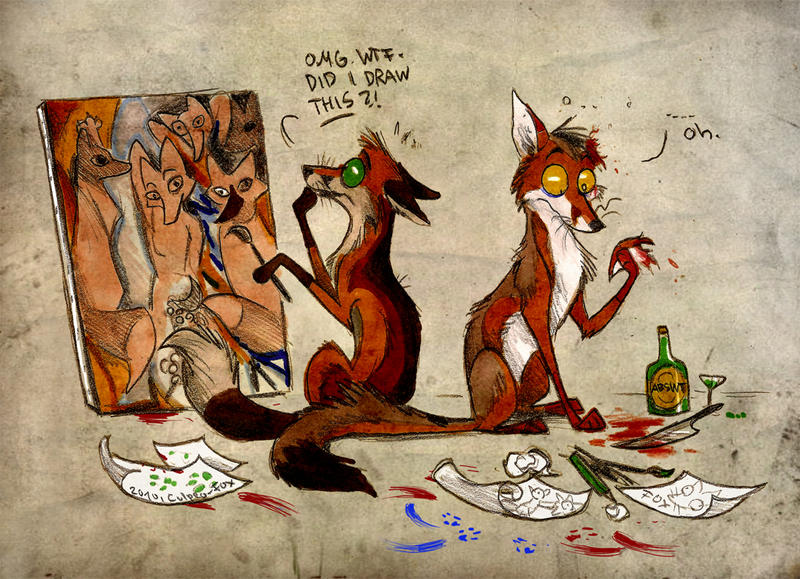Out of Madness Comes Life: Are The Arts Crazy?
Sometimes, writing is tough. The passion isn’t there, and every word is a struggle. We’ve all had those moments when forced to do something artistic or creative, whether it be writing or drawing or playing an instrument (or anything really). We’re just not into it, we don’t feel the pulse of the art pounding in our blood. Yet at other times, it’s like our blood rushes in a massive torrential pour, as if it had been held back by a massive dam for a thousand years. Whether its a subject that makes you jump for joy, a song you can head-bang to, or some other Picasso, some things just burst forth in a sudden and fervent explosion of productivity and creativity.

A Tongue Twister: Are Artists' Artistry Artful?
I think we’ve all had those moments when the pieces all click together, and a piece of work flows from us as easily as a hot knife through butter. During those moments, we feel alive, throbbing with a vibrant energy as our whole being is focused onto a single task. It’s an exhilarating feeling, yet at the same time, when you finally come down out of this strange natural high, it feels as though there was something slightly wrong about that, as if those who are capable of reaching that level often must have something wrong with them.
This is a popular idea. Edgar Allen Poe alluded to this creative madness in his work, ‘The Tell Tale Heart.’
“The disease had sharpened my senses –not destroyed –not dulled them. Above all was the sense of hearing acute. I heard all things in the heaven and in the earth. I heard many things in hell. How, then, am I mad?”
Art and creativity have always had their associations with mental issues and powerful personalities. There have always been the stereotypical caricatures of artists:
1) The outcast, socially ill-fitting writer.
2) The out-of-control musician.
3) The quirky and always slightly off painter.
4) The obsessed photographer, whether of the strange shut-in type or the perpetually traveling variety.
Need I go on?
However, these associations have not been without reason. Many famous individuals have been associated with mental disorder. Examples include Vincent Van Gogh and Ludwig Von Beethoven. Others, such as Poe or Richard Wagner, were known to be either troubled or highly passionate, flamboyant individuals.
And recently, a pretty intense population study spearheaded by some pretty cool Swedish guys has actually corroborated some of these general associations. The field has long been investigated and various findings thrown around left and right; unfortunately most of those have been marred by awful experimental design. This Swedish study is an exception. Using a forty year population study encompassing more than a million people, the results are finally in, and some people may be a little disappointed: generally, some associations are there, but they certainly aren’t that strong.

Overall, creative professions were not associated with an increased risk of psychiatric disorders (except for a mild increase in bipolar disorder), despite there being a link between a familial history of disorders and profession. In other words, families of those people who did creative things were more likely to suffer from psychiatric conditions, on average. Although creative professions as a whole had no correlation with disorder, writers were another story entirely. Apparently, writers generally get the short end of the stick when it comes to mental health, as they were more than twice as likely to be diagnosed with schizophrenia and bipolar disorder. In addition, they were at a noticeably higher risk for suicide.
Yet despite these findings, a part of me recoils at the idea of “creative” people being more likely to suffer from things like bipolar disorder. What is creativity anyways? Creativity is being able to associate items and express thoughts in novel ways, to make connections where others have yet to be made. Creativity is thinking in a slightly different way, reaching a new conclusion or finding a new way to reach that conclusion.
Albert Einstein was creative. So was John Nash.
In fact, I see high achievement as having a closer link to conditions such as schizophrenia and bipolar disorder than the typical association with the arts. However, true creativity has nothing to do with doing anything artistic. It is about making new connections and visualizations of things, and being able to express those in a way for other people to understand and interpret.
Creativity is visualizing riding a bicycle along a beam of light, and imagining what that beam of light would look like. It is revolutionizing game theory. It’s a powerful novel about a dystopian future that touches on some of the most powerful issues in the world today. Creativity is all of these things, and more. More than just the arts, more than the sciences.
Creativity is about uniqueness and newness. Everyone has the capacity for those.
Sources:
Creativity and Mental Illness – Canadian Journal of Psychiatry
Swedish Population Study – Science Direct
Mental Illness vs. The Arts – BBC News
Art and Personality – New York Times